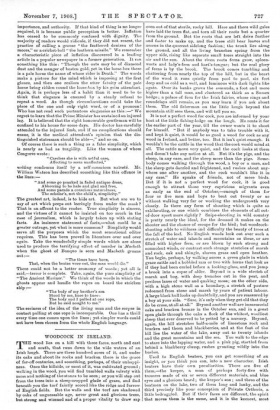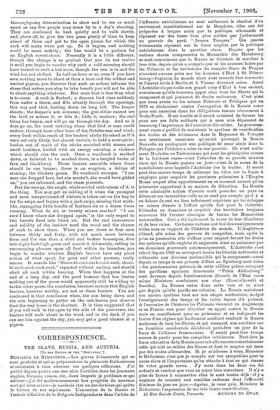WOODCOCK IN IRELAND.
THE wood lies on a hill with three faces, north and east and south, that runs down to the wide waters of an Irish lough. There are three hundred acres of it, and under its oaks and about its rocks and bracken there is the grace of far-off centuries, and something, perhaps, of their unhappi- ness. Once the hillside, or most of it, was cultivated ground ; walking in the wood, you will find tumbled walls velvety with moss and nothing of the stones to be seen ; or you will step out from the trees into a sheep-cropped glade of grass, and find beneath you the turf faintly scored like the ridge and furrow of English fields. But the walls and the turf are shadowed by oaks of unguessable age, never great and glorious trees, but strong and wizened and of a proper vitality to draw sap
even out of that sterile, rocky hill. Here and there wild gales have laid the trees flat, and torn all their roots but a quarter from the ground. But the roots that are left drive further and faster to make up, and the trees still bear leaves and acorns in the queerest sidelong fashion ; the trunk lies along the ground, and all the living branches spring from the upper side, rising like separate small trees straight into the air and the sun. About the riven roots ferns grow, spleen- worts and lady's-fern and hart's-tongue; but the real glory of ferns is by the brook. The brook comes tumbling and chattering from nearly the top of the hill, but in the heart of the wood it runs quietly from pool to pool, six feet deep and as cold as a well, and luminous with dark lights like agate. Over its banks grows the osmunda, a foot and more higher than a tall man, and clustered as thick as a Sussex hedge ; a palace of fern for the Irish fairies, whose rings and roundelays still remain, as you may learn if you ask about them. The old fisherman on the little lough beyond the mountain still sees them, and will tell you so.
It is not a perfect wood for cock, you are informed by your host at the little fishing-lodge on the lough. He rents it for the earlier part of the year, till the owner wants it to shoot for himself. " But if anybody was to take trouble with it, and kept it quiet, it would be as good a wood for cock as any wood in Ireland, and better, too. But it isn't quiet enough. It wouldn't be the cattle in the wood that the cock would mind at all. The cattle move very quiet, and the cock looks at them and doesn't take any notice at all. But it's the pigs, and the sheep, in any case, and the sheep more than the pigs. Some- body comes walking through the wood, a boy or a man, and the sheep gets dazzled and frightened, and rushes about any- where one after another, and the cock wouldn't like it in any case." He speaks of friends, not of mere birds. But if it is not a perfect wood for cock, it is good enough to attract those very capricious migrants even as early as the end of October,—enough of them for four or five men and boys to beat out twenty or so without walking very far or working the undergrowth very closely. Is there any form of shooting which is quite so exhilarating, or one which combines the elements of all out- of-door sport more rightly ? Snipe-shooting in wild country is pretty nearly the ideal, for the demand it makes on the shooter and the chance of escape for the bird ; but woodcock- shooting adds to wildness and difficulty the beauty of trees at the fall of the leaf. No English woods look out over such a stretch of water and islands and mountains as these, or are filled with higher fern, or are blown by such strong and somnolent winds, or contrast such strange stretches of marsh and rock, oak and shingle, shaven grass and open heather. You begin, perhaps, by walking across a green glade in which graze cattle and a hobbled rain or two with horns that look as if they had been curled before a looking-glass, and you jump a brook into a copse of alder. Beyond is a wide stretch of marsh and bog, with deep trenches cut in the peat, and perilous lanes of water and quaking moss; on the other side, with a high stone wall as a boundary, a stretch of pasture redeemed from stone and marsh by years of patient labour. A large black bull looks up doubtfully, and you are reassured by a boy at your side. " Sure, it's only when they get old that they do be cross, at all at all." Beyond another wall are immemorial oaks and bracken bronze in the October sun, and in a great open glade through the oaks a flock of the whitest, woolliest sheep that ever deserved to be petted by a nursery. Beyond, again, the hill stretches half-a-mile of limestone rock and bracken and thorn and blackberries, and at the foot of the bill lies the water of the lake, away out to twenty islands and the great mountains and the sea. You walk to the edge to stare into the lapping water, and a pink pig, startled from behind a blackberry clump, rushes grunting wildly into the bushes.
Used to English beaters, you can get something of an insight, or you think you can, into a new character. Irish beaters have their own peculiarities. There are five of them,—the keeper, a man of perhaps forty-five with trousers made of six or seven different materials, and blue eyes and a glorious beard ; the keeper's son ; and three of the boatmen on the lake, two of them long and lanky, and the third precisely like your conception of Private Ortberis, a little bedraggled. But if their faces are different, the spirit that moves them is the same, and it is the keenest, most thoroughgoing determination to show and to see as much sport as any five people may come by in a day's shooting. They are cautioned to beat quietly and to walk slowly, and, above all, to give the two guns plenty of time to keep ahead of them and get to the open places for which the cock will make when put up. So it begins, and nothing could be more orderly ; the line would be a pattern for an English covert-shoot. Presently it is a little different, though the change is so gradual that you do not realise it until you begin to wonder why such a cold morning should have turned to such a hot noon, though the sun is in and the wind has not shifted. In half-an-hour or so, even if you have seen nothing more to shoot at than a bare and the wildest and wariest pigeon, you discover that such an ardour informs the chase that unless you stop to take breath you will not be able to shoot anything whatever. But even that is less than what is to come. A cock is flushed ; a demure bird rises suddenly from under a thorn, and flits silently through the openings, this way and that, looking down its long bill. The keeper shouts; the keeper's son screams; the gun either cannot see the . bird, or misses it, or hits it ; little it matters ; the real- thing has begun, and will go on through the day. And so it does go on, the most untiring chase that bird or man could endure, through hour after hour of the October sun and wind; every bush within reach of the beaters' sticks thrashed as if it were not only likely, but almost certain, to bold a menagerie; bushes out of reach of the sticks searched with stones and small boulders, hurled with an energy amazing, a violence which should rive the rock. Once a woodcock is marked down, or believed to be marked down, in a tangled brake of fern and blackberry. Three beaters assemble where there should be one beater; there is an eruption, a deluge of stoning; the thickets groan. No woodcock emerges. " I am sure she dropped here, but she mustn't, she would have glided on," you are informed, and the chase proceeds.
But the energy, the single, whole-souIed enthusiasm of it, is the thing. You may get an inkling of it when the youngest and most inexperienced of visitors is taken out on the bog to try for snipe, and begins with a jack-snipe, missing that moth- like, zigzagging little bundle of feathers six or a dozen times running. What do six or twenty misses matter? "I am sure I know where she dropped again," is the only sequel to two barrels fired into blank air. But the real immanence and solidity of the instinct need the wood and the chance of cock to show them. When you see three or four men between thirty and forty, with not much more between them and the sun than a shirt and broken homespun, dive into eight-foot-high gorse and search it intimately, calling in encouraging phrases upon all fowl within its branches, you begin to wonder whether English beaters have any great notion of what sport, for guns and other persons, really means. It sounds like "Shure-bi-cock-cock-cock-cock, attire- hi-cock-cock-cock-cock," repeated without ending, and should elicit all cock within hearing. When that happens at the end of a long day, and the good humour that has beaten nothing out of the gorse would apparently still be willing to tackle other gorse, the conclusion becomes certain that English beaters, however worthy, are not as these beaters. You are confirmed in that conclusion when, the sun being down and the rain beginning to patter on the oak-leaves, you observe that the way home is the shortest. It is then suggested that if you will walk in the open by the side of the pine-trees, the beaters will walk about in the wood, and in the dark, if you can see him against the sky, you may get a good chance at a pigeon.





























































 Previous page
Previous page